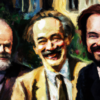In Dostoevsky’s “The Brothers Karamazov,” the characters of Ivan and Zosima represent two different perspectives on the human condition. Ivan, with his strong intellect and reason, struggles with the idea of a God who allows for the suffering of innocent people. He ultimately rejects the idea of God and religion, leading to feelings of isolation and despair. On the other hand, Zosima, a monk, embodies the principles of compassion, love, and community. He believes in a God who loves and forgives and encourages others to do the same.
These two characters can also be compared to literary figures from other works. Nietzsche’s Zarathustra, from “Thus Spoke Zarathustra,” also grapples with the idea of God and the suffering of humanity. He ultimately rejects traditional religious beliefs and embraces the idea of the “superman” or “overman,” who creates his own morality and purpose. Similarly, Camus’ Meursault from “The Stranger” also struggles with the meaning of life and the idea of God in the face of suffering and death. He ultimately embraces the concept of the absurd, in which life has no inherent meaning and one must create their own purpose.
While Ivan, Zosima, Zarathustra, and Meursault all come to different conclusions about the human condition and the existence of God, they all share a common thread of searching for truth and meaning in a chaotic and suffering world. Through their struggles and insights, we as readers can learn important lessons about the importance of self-reflection and the search for meaning in our own lives.
One lesson is the danger of becoming too entrenched in our own perspectives and beliefs, as Ivan does. His rejection of God and religion leads to feelings of isolation and despair. It is important to constantly question and challenge our own beliefs but to also be open to the perspectives and beliefs of others.
Another lesson is the importance of compassion, love, and community in our lives, as exemplified by Zosima. The human condition is often difficult and suffering is a part of life. But by reaching out to others and connecting with them, we can find solace and meaning in our shared experiences.
Additionally, from the characters of Zarathustra and Meursault, we can learn about the importance of creating our own morality and purpose in life. It is easy to fall into the trap of following societal norms and expectations, but ultimately, each individual must find their own meaning and purpose in life.
In conclusion, through the characters of Ivan, Zosima, Zarathustra, and Meursault, “The Brothers Karamazov,” “Thus Spoke Zarathustra,” and “The Stranger” offers profound insights into the human condition and the search for meaning in a suffering world. These literary figures serve as a reminder to constantly question and challenge our own beliefs, to find compassion and community in others, and to create our own morality and purpose in life.
